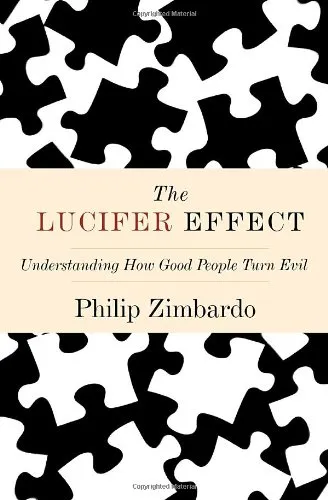The Lucifer Effect: Understanding How Good People Turn Evil
4.5
Reviews from our users

You Can Ask your questions from this book's AI after Login
Each download or ask from book AI costs 2 points. To earn more free points, please visit the Points Guide Page and complete some valuable actions.The Lucifer Effect: Understanding How Good People Turn Evil
"The Lucifer Effect: Understanding How Good People Turn Evil" by Philip Zimbardo offers a profound exploration of the forces that cause ordinary people to engage in seemingly inexplicable acts of brutality and evil. Rooted in Zimbardo's landmark Stanford Prison Experiment, the book delves deep into the psychological mechanisms that can transform moral individuals into perpetrators of wickedness.
Detailed Summary of the Book
At the core of "The Lucifer Effect" is the detailed account of the Stanford Prison Experiment, conducted in 1971, where college students were assigned roles as guards and prisoners in a simulated prison environment. The experiment demonstrated the ease with which individuals could embrace severe behaviors when placed in environments that facilitated such transformations. Zimbardo's work expands on these findings by analyzing historical, social, and military contexts, such as the abuses at Abu Ghraib prison, to illustrate similar dynamics on larger scales.
The book systematically explores the complex interplay of situational variables, systemic structures, and individual dispositions. Zimbardo presents the shocking thesis that anyone is capable of evil under the right circumstances, dissolving the clear line often perceived between good and evil. He emphasizes that understanding context, rather than inherent trait deficiencies, is crucial to comprehed how and why people can commit evil acts. The exploration also extends into personal responsibility, wherein Zimbardo addresses how individuals can resist negative influences and make ethically sound decisions, even under pressure.
Key Takeaways
- The power of situational and systemic factors often outweighs individual morality and decisions.
- Ordinary people can commit extraordinary acts of evil under extreme circumstances.
- Awareness and understanding of these influences can create avenues for personal and societal resilience against evil.
- Cultivating self-awareness and ethical vigilance is essential for resisting social and situational pressures.
Famous Quotes from the Book
“The line between good and evil is permeable and almost anyone can be induced to cross it when pressured by situational forces.”
“Evil is knowing better but willingly doing worse.”
Why This Book Matters
"The Lucifer Effect" remains a significant work in understanding human behavior and ethics. By shedding light on the correlations between individual actions and overarching systems, Zimbardo's work serves as a critical resource for psychologists, sociologists, educators, and policymakers alike. The book is a clarion call for encouraging empathy and fostering environments where human dignity is upheld and safeguarded against deteriorating moral standards. As new instances of moral failing continue to appear across different sectors worldwide, the insights from "The Lucifer Effect" are more relevant than ever, emphasizing prevention by systemic change and the promotion of ethical responsibility.
Free Direct Download
You Can Download this book after Login
Accessing books through legal platforms and public libraries not only supports the rights of authors and publishers but also contributes to the sustainability of reading culture. Before downloading, please take a moment to consider these options.
Find this book on other platforms:
WorldCat helps you find books in libraries worldwide.
See ratings, reviews, and discussions on Goodreads.
Find and buy rare or used books on AbeBooks.


